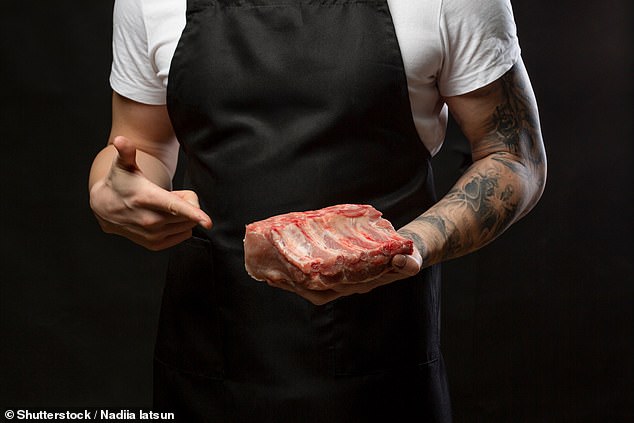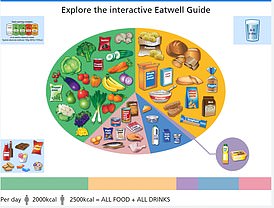You might think that vegetarians and vegans are a bunch of peace-loving hippies.
But a new study shows that the stereotype of the tofu-eating pacifist couldn’t be further from the truth.
Contrary to popular belief, vegetarians actually have a greater hunger for power than their omnivorous peers.
Meat-eaters, meanwhile, are more strongly associated with values like kindness, conformity, and social harmony.
Study author Dr John Nezlek, of SWPS University in Warsaw, says this mistaken impression likely emerges from the fact that the overwhelming majority of vegetarians are women.
However, in reality, vegetarians are much more likely to express traditionally masculine values, such as the desire for personal success, than ‘manly’ meat-eaters.
Dr Nezlek told MailOnline: ‘When you think about a vegetarian, you think of someone who’s warm, fuzzy, and “huggy”.
‘Well, in terms of the values that people espouse and what they aspire to, it’s just not the case.’

The stereotype of the ‘hippie vegan’ couldn’t be further from the truth as a study shows that those on plant-based diets have a greater hunger for power than meat-eaters (stock image)
Dr Nezlek surveyed 3,792 vegetarians, including vegans and those on plant-based diets, and non-vegetarians from the US and Poland.
Unlike previous studies which focused on vegetarians’ personality traits, Dr Nezlek surveyed the participants to study their deepest convictions and values.
During the study participants were given short descriptions of hypothetical individuals such as ‘he likes to impress other people’ or ‘thinking up new ideas and being creative is important to her’.
For each of these descriptions, the participant was then asked: ‘Do you see yourself in that person?’ – responding on a scale from one, not at all, to six, very much like me.
These tests are designed to reveal the set of basic values that influence people’s patterns of behaviour throughout their lives and determine many of their choices.
But when the data came back, the results were so far removed from the established stereotypes that Dr Nezlek initially thought something had gone wrong with the test.
However, after collecting more samples, the results clearly showed that everything most people think about vegetarians is incorrect.
Contrary to popular belief, vegetarians were consistently more likely to align themselves with values linked to power, defined as the desire for control over people and resources.

Vegetarians such as Zendaya (pictured) often say they became vegetarian for ethical reasons. But research now suggests that those who shun meat typically value benevolence and social harmony less than meat eaters

Vegetarians, such as former Labour leader Jeremy Corbyn, were more likely to value personal achievement, success, and power rather than meat eaters and were less likely to value social harmony
Vegetarians were also more likely to value personal success or achievement and stimulation in the form of excitement, novelty, or challenges.
Omnivores, on the other hand, were more likely to value conformity to social norms, safety and security, and preserving the welfare of those around them.
Vegetarians still value ‘benevolence’, preserving or enhancing the welfare of those close to themselves, but not as much as meat eaters.
These differences are not so large that they would be noticeable in one individual – what psychologists would call a ‘small to moderate’ difference.
However, across a large enough population the difference between vegetarians and non-vegetarians would become apparent.
Dr Nezlek says: ‘Over time, small differences begin to have large consequences and, if you interact with vegetarians over and over again, you begin to see that these people are not tree huggers who are going to back down.’
What is less clear is whether having these values predisposes someone towards becoming a vegetarian or if they are developed as a result of the lifestyle change.
However, Dr Nezlek says that upcoming research on how long people have remained vegetarian may be able to shed light on this question in the future.

Meat eaters were more likely to value conforming to social norms, safety, and ensuring the welfare of those close to them (stock image)
Vegetarians also gave less emphasis to values such as conformity, security, and benevolence which are linked with order and tradition.
This suggests that the biggest difference between veggies and meat-eaters may be a desire for independence and a non-conformist streak.
Yet it also points to a sort of psychological toughness and willingness to go against the grain which is required to be a vegetarian – a group which has historically been a ‘berated minority’.
Dr Nezlek says: ‘If you’re a member of a minority group which gets criticized more often than members of the majority, you’ve got to have some stones to hold those values.
‘Particularly because vegetarians adopt their diets, that means they’re going to have to stand up for themselves and you’ve got to have the values that support that.’

